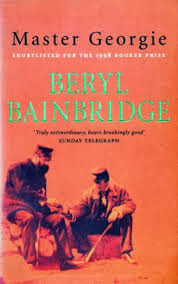
The question is, how had I not heard of Beryl Bainbridge before now? I have a sort of suspicion that her dreadful home counties name had put me off, making me think she likely wrote detective fiction of the murder-on-the-village-green description. GOOD GOD I WAS TOTALLY WRONG. This is a ravishing novel, technically perfect, it’s only fault being that it is too short.
MASTER GEORGIE tells the story of a surgeon and amateur photographer who travels to the Crimean War. The story is however not told in his voice, but in that of three of his associates: an orphan girl who is in love with him, his academic brother-in-law, and a poor young man who is his assistant. The genius of the book lies very much in how beautifully evoked these three characters’ internal lives are, with never a false note. They create the atmosphere of the Crimean war beautifully, and while much research has clearly gone into this book, it is worn lightly. The Crimean war is famous for being the first war to be really photgraphed, which means it is the first war in which civilians at home got a true sense of what war really meant, and much has been written as to its significance. To write an entire novel about a photographer in the Crimean without ever once bring up this dead horse for a beating is a real achievement.
There are many snippets I found charming, but here is one from the voice of the poor young man, who is great pragmatist:
“Should I obtain a post at Scuratri,” he (George) said, “it would give me great peace of mind if you would stay here and arrange passage home for Annie and the children.” I agreed, of course. How could I refuse? He then began a rambling discourse to do with his past life, regrets, wasted opportunities, lack of application, etc, and how he felt, in some mysterious way, that the war would at last provide him with the prop he needed.
Also quite charmingly, the romantic heroine is the orphan girl, Mrytle, and everyone is surprised to learn that Master George might be interested in her: “he being the shallow sort of fellow susceptible to more obvious charms – a rosy complexion, sparkling eyes, splendid bust, etc. Myrtle was smallish, pale, had a chest as flat as a board . . It’s true that when she engaged one in conversation, or was observed playing with the children, or she smiled, it was a different story. Then I do believe she cast a spell.” I think I might start a collection of all the times a female novelist tells us her heroine, while not conventionally pretty, is lit up by her intellect, or her heart, which in the end wins everyone over. Total wish fulfillment on the part of novelists, and I think we can trace a straight line from the mother of them all- Jane Eyre – straight through to Bridget Jones.
Though I did love this book, I also feel resentful of it. Within the first couple of pages I was already slowing down my reading, dreading the end; and now I’ve finished it, I feel mad at the wonderfully talented Beryl Bainbridge for sucking me in and then dumping me out so abruptly.
